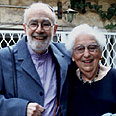
Have you ever heard the story of Sarah Schnirer, Hannah Maisel Shochat? How about Rosa Luxemburg? Thousands of women throughout time have contributed in meaningful ways to Judaism, the Land of Israel and the societies and countries in which they lived in the Diaspora. Women have been pioneers, revolutionaries, and inventors; however they barely get any attention in history books or Jewish encyclopedias for their accomplishments.
A recently-released encyclopedia, the work of Moshe Shalvi and his wife, Israel Prize winner Prof. Alice Shalvi, tries to correct this injustice by giving Jewish women the attention they have been denied. Jewish Women: A Comprehensive Historical Encyclopedia is a wide-ranging information bank on noteworthy Jewish women and their relatives throughout history.
The idea behind the women's encyclopedia popped into Moshe Shalvi's head in the '90s after reading criticism in a publication about books authored by women. "I was amazed by the quantity of printed material, which included fictional literature and reference books (written) by women.
"I asked myself – how can we get our hands around all this?" Moshe recounts how this question led him to compose the encyclopedia he would later author with his wife.
Shalvi is considered the "encyclopedia man." In the past, he has been contributed to encyclopedias on subjects such as Judaica, Hebrew and the Holocaust.
After the idea to write the women's encyclopedia was hatched, Moshe carefully read over 15 volumes of Judaica encyclopedias – page by page – and calculated the quantity of information on women or areas relevant to them that he could find in them. "It became clear that from about 13 million words only 400 thousand dealt with women," on women or areas relevant to them explains.
'Her story'
Out of desire to correct the injustice that has been done to women by leaving the details of their lives out of print, Shalvi devised a plan to compose an women's encyclopedia that would cover all of women's achievements throughout the world. However, after he realized the effort this ambitious plan would require, he decided to stick to what he knows: women in Judaism.
And so the project was born. Moshe assembled the information and his wife Elise took on the position of editor. The result was a digital encyclopedia (on CD-ROM) composed in English with over 2,000 entries (3.2 million words), biographies, and articles – most which include modern and updated research. Every women mentioned in the Old Testament received an entry in the information bank including Midrash commentary about each one.
The encyclopedia is categorized by geography, professions, time period and more.
"This is a big contribution to the field of women's studies and does justice to a whole constituency that for generations did not receive the recognition it deserved," Profess Shalvi said. "This work's big achievement is the presentation of 'her story.'"
Story of Clara Immerwahr
One of the entries concerns itself with the life of Clara Immerwahr. Born in Germany in the 19th century, she was the first woman to receive a doctorate in chemistry at a German university where she worked as a scientist.
After being granted the degree, she declared that she would never work on a project that went against her personal philosophy. She eventually married a scientist – also a chemist like herself – and aided him in his research.
After the outbreak of World War I, her husband began working on a program to develop chemical weapons. She argued with him constantly over his participation in this heinous enterprise. Apparently because of this, in 1915, after her husband returned from the front where he had used chemical weapons, she committed suicide.
The encyclopedia was edited by Prof. Paula Hyman from Yale University and Prof. Dalia Ofer from Hebrew University.















